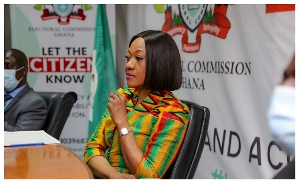 Chairperson of the Electoral Commission, Jean Mensa
Chairperson of the Electoral Commission, Jean Mensa
Jean Mensa, the current Chairperson of the Electoral Commission (EC) of Ghana, has been a pivotal figure in the country’s electoral landscape. Her leadership has highlighted several electoral challenges that need to be addressed to enhance the integrity and effectiveness of Ghana’s electoral process. Here are some key issues associated with her tenure and the broader electoral problems in Ghana:
Key Challenges
Perceived Bias and Controversy:
• Allegations of Partisanship: The EC under Jean Mensa has been perceived as biased towards certain political parties, particularly during election periods. This perception can undermine public confidence in the electoral process.
• Political Tensions: Her leadership has been marked by heightened political tensions and accusations from opposition parties, creating an atmosphere of distrust.
Voter Registration Issues:
• Challenges in the Registration Process: The voter registration process has faced criticism for inefficiencies and accessibility issues, especially for marginalized communities. Delays and complications can disenfranchise potential voters.
• Controversial Decisions: Decisions regarding voter registration, such as the use of specific identification documents, have sparked debates about inclusivity and fairness.
Election Management and Logistics:
• Logistical Challenges: The organization of elections has encountered logistical hurdles, including the timely distribution of voting materials and the management of polling stations. These issues can lead to confusion and disenfranchisement on election day.
• Technology Integration: The implementation of biometric systems and other technological measures has faced scrutiny, with concerns about their reliability and security.
Dispute Resolution Mechanisms:
• Ineffective Dispute Handling: The mechanisms for resolving electoral disputes have been criticized for being slow and ineffective, leading to dissatisfaction and unrest among political parties and voters.
• Lack of Clarity: Ambiguities in electoral laws and regulations can complicate the dispute resolution process, leading to further tensions.
Public Confidence and Participation:
• Erosion of Trust: Ongoing controversies and challenges can erode public trust in the electoral process, leading to decreased voter turnout and engagement.
• Civic Education: There is a pressing need for enhanced civic education to inform citizens about their rights and the electoral process, encouraging active participation.
Need for Reforms
Strengthening Independence:
• Ensuring Neutrality: It is crucial to bolster the independence of the Electoral Commission to operate free from political pressure and restore public confidence in its impartiality.
Reforming Voter Registration:
• Inclusive Practices: Reforming the voter registration process to make it more accessible and transparent can help ensure that all eligible citizens can participate in elections.
• Clear Guidelines: Establishing clear and fair guidelines for voter registration can reduce disputes and enhance trust in the process.
Improving Election Management:
• Logistical Planning: Implementing better logistical planning and resource allocation can help streamline the electoral process and address challenges related to material distribution.
• Technology Assessment: Regular reviews and assessments of technological systems used in elections can ensure their reliability and security.
Enhancing Dispute Resolution:
• Clear Procedures: Developing clear and efficient procedures for resolving electoral disputes can improve the overall electoral process and reduce tensions.
• Public Awareness: Educating the public about dispute resolution mechanisms can empower citizens and political parties to engage constructively.
Civic Engagement and Education:
• Promoting Voter Education: Investing in civic education initiatives can empower citizens, increase voter turnout, and strengthen democracy.
• Encouraging Participation: Creating platforms for dialogue between the EC, political parties, and citizens can foster trust and collaboration.
Conclusion
Jean Mensa’s tenure as the Chairperson of the Electoral Commission has highlighted various challenges in Ghana’s electoral process. Addressing these challenges through comprehensive reforms is essential for enhancing the integrity, transparency, and effectiveness of elections in Ghana. By focusing on improving the electoral system, Ghana can work towards a more robust democracy that truly reflects the will of its citizens.
Watch some videos from the recent Parliamentary sittings below: